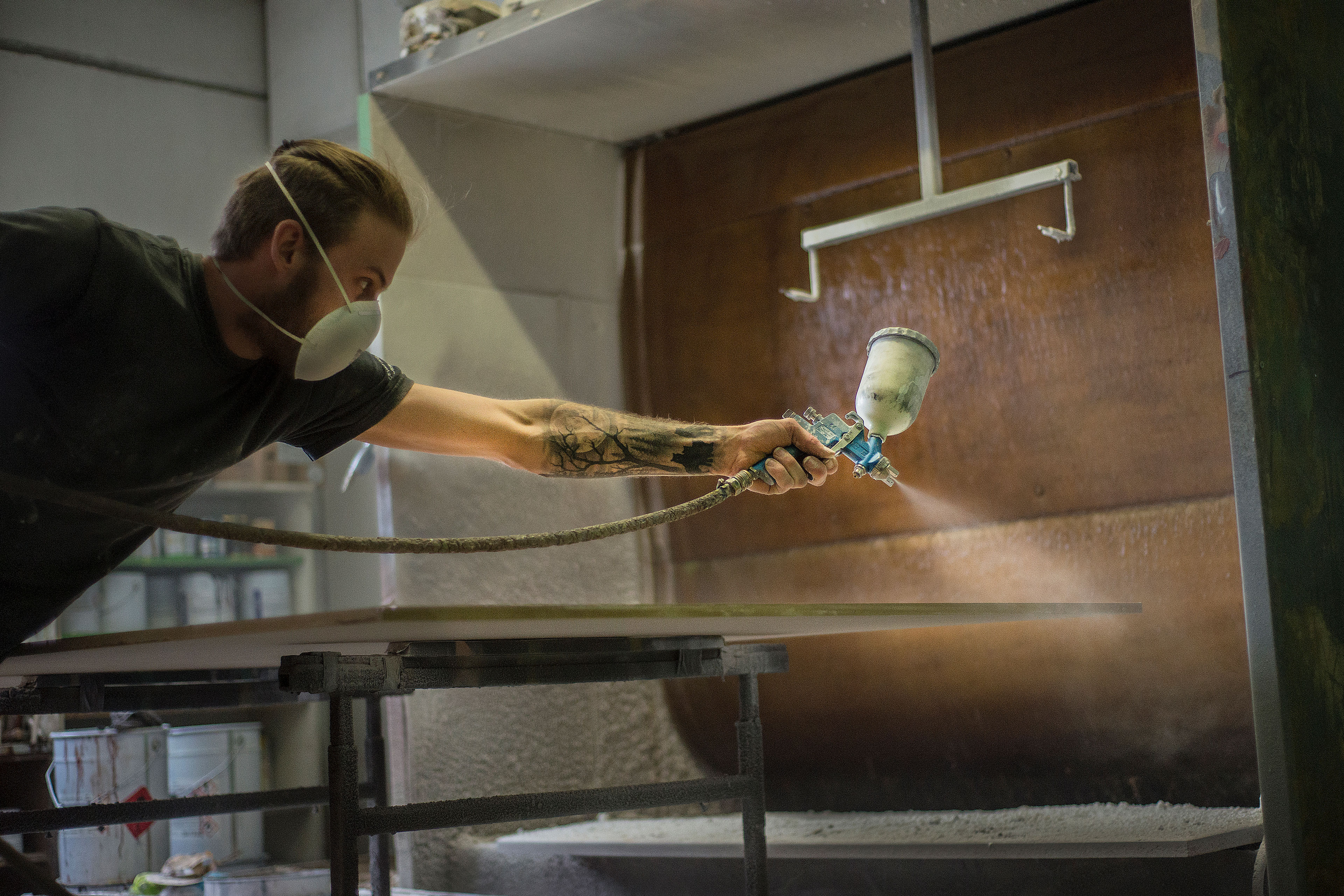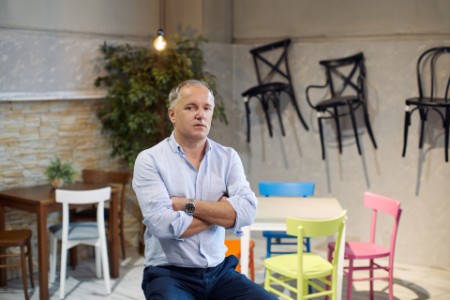The employees are the company. We can have the best computers, but without good people we have nothing.
Mitja Škerjanc
Start with sponges, boom with tabourets
The Škerjanc family business was born in 1993 when a mother, her son Mitja and his wife Larisa joined forces and began producing elk skin sponges in their garage with a Bogat sewing machine. “We had help from Jože Šepič from Gradišče, who cut the foam, while we finished the products he then put onto the market,” remembers Mitja. Because the car industry was flourishing at the time, the number of employees in the company also grew. Mitja’s mother, who first worked in a bank and later took care of the company’s finances, had good business sense. They also had help from Mitja’s wife Larisa, who after 20 years of work in the company now manages the premises. By working with Italians, they quickly shifted from sponges to chair upholstery. “Italians opened a plant with us and three other local companies. Thus, in the span of five years we expanded to eight employees. We started cooperating with the company Damen Sežana, so that we produced the chair backs, Damen Sežana produced the seats, while Šepič cut the foam – we were like a mini consortium that worked for one strong customer,” adds the Director. When production started flagging after 2004, the Italian owner cancelled the cooperation and moved the production to Bosnia and Herzegovina. Mitja remembers: “It was a big shock. Our company had 10 employees, there were 30 in Sežana, and Šepič in Gradišče had 20. We went looking for alternatives.” But at the age of 35, Mitja was still full of zeal and he started producing tabourets. “Tabourets were my idea. Because they were based on expanded polystyrene they were light, unlike the classic tabourets made from plywood,” adds Mitja. A cooperative venture with Lesnina then followed. “Tabourets were a true boom and we made between 30 and 40 thousand each year,” he explains. Mitja knew all along that they could not survive solely based on service activities, which is why they engaged in production as well as commerce: “I said that the Škerjanc company would make 80% of our earnings from commerce and 20% from production, and this is a guideline we still follow.”
Members of the Škerjanc family business say that good business relations are important, adding that competition feeds innovation.
Expansion into Croatia brought growth
The company’s expansion began in 2008, when they moved into new premises. “We started actively working on commerce, sales and marketing. I alone travelled between 80 and 90 thousand kilometres annually. We cooperated with furniture stores, such as Harvey Norman, Rutar and Lesnina.” In 2010, they began expanding into the Croatian market, where they had to wait until the country joined the EU for better conditions. “In 2013, we were already managing our own projects, we worked in engineering, looked for new trainees and educated them,” says Mitja. In the last six years, they have posted enviable annual growth of between 15% and 20%, mainly due to exports. “We sell 150 thousand chairs and 30 thousand tables annually, as well as furniture for restaurants and garden furniture. We engineer products for hospitals, medical centers, nursery schools and turnkey hotels,” says Mitja. They offer complete services to their clients, producing custom-made furniture and attempting to fulfill expectations as much as possible. “A great benefit to the company is our partnership with the furniture production company in Mengeš, where they produce all wooden parts for surface furniture,” explains Mitja. In Croatia, they have an independent company in Zagreb that is complemented by a showroom, but they are also present in Imotski near Split, and this year they are opening a logistics center and showroom in Šibenik.
The company’s growth in Slovenia has been constant for some years now, where they now invest less than in Croatia: “Croatia represents 40% of our earnings. Last year, we made €8 million earnings, of which €3.5 million was from Croatia.” Due to rapid growth, they have occasionally been “burned”, experienced fatigue and suffered complaints, which is why they now insist on moderate 10% to 15% growth. “If you want to ensure high quality, you can’t cling to numbers. Quality soon suffers and so does the brand. The added value is what’s important.”
Good business demands full commitment. You have to be available for 12 hours, but also know when to take time for a break.
You work 12 hours for a good business
In Škerjanc, they have between 40 and 50 employees, depending on the season and orders. “We employ 10 people in production, 10 in the warehouse, 10 drivers, around 10 people in sales, two in finances, from seven to eight in Mengeš and around five in Croatia, while others are external collaborators,” says Mitja. Local employees are fewer each year because more and more young people come to work for them from Croatia: “We are looking for one wood engineer and can’t find any. When we look for an economist, we receive 10 thousand applications. But nobody wants to do anything outside their training, which is why we import employees.” According to Mitja, the nature of their work is such that it is not finished after eight hours. “For a good business, you have to spend 12 hours in the company, after which you have to take at least a couple of days for rest and relaxation,” says the Director. Mitja stepped back from the position of Executive Director last year: “You have to step back when you realize that the time has passed in which you can be fully committed to the company with your thoughts.”
The Škerjanc company produced €8 million earnings last year and they have moderated company growth to between 10% and 15%.
A restless business spirit
Mitja thinks highly of improvisational skills, creativity and broad-mindedness. He encourages these qualities in his employees. “Improvisation is harder and more stressful,” he explains. He himself often undertook a new project. “I often had different ideas. At one time, I also sold lights and created overdrafts, but I had to try it. This is due to my restless spirit,” he says, smiling. He tells his employees that they are innovators, who do not just follow trends but co-create them. “I enjoy watching young people employed in my company, who are brave, have ideas and who undertake things that turn out to be successful,” he describes. He constantly encourages his colleagues to be friendly, to make a good first impression and to respectfully communicate with their clients. “You have to invest in people and pay them for their work. The employees are the company. We can have the best computers, but without good people we have nothing,” he stresses.

Competition is good if it is fair
“I always work on good and fair relationships,” stresses Mitja and adds that “competition is good, but we also have to respect each other.” He believes that in life there are too many unnecessary grudges. “Networking is important in business as well as good relationships with all people,” he adds. He believes that in business it is of utmost importance to have values. “You always have to be human and this is what you get in return,” he insists. He does not want to burden his children with the assumption of duties in the family business. “My son, who studies architecture, has helped in the company during holidays since the sixth grade. He knows the company, but not every detail. My daughter is currently in the ninth grade of primary school,” says Mitja and does not subscribe to the belief that he should have burdened his children, from a young age, with the pressure of taking over the company. “This is a hard task and to carry the burden that fell from above is not fair. My son is present in the company, but his priorities are his studies,” he adds.
What is his vision for the growth of the family business? Short-term plans are the construction of a logistics centre and a showroom in Šibenik and other goals include increasing their presence on the Italian market. Long-term goals are the construction of new warehouses and a logistics centre within a radius of one kilometre in the span of the next three years. “The goal is the addition of around 8000m² of warehouse space, which will require an investment of between two and three million euros. We would employ 10 to 15 new employees,” he explains.
Summary
Škerjanc in a nutshell: improvisation, creativity, good relations, honesty, family.


